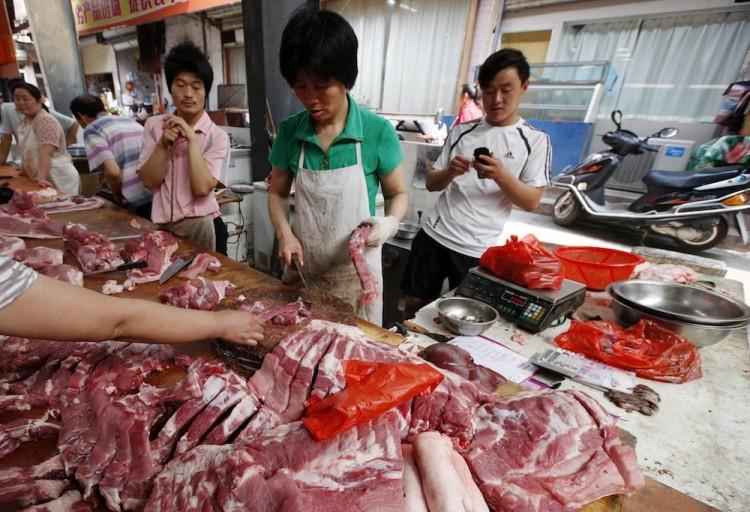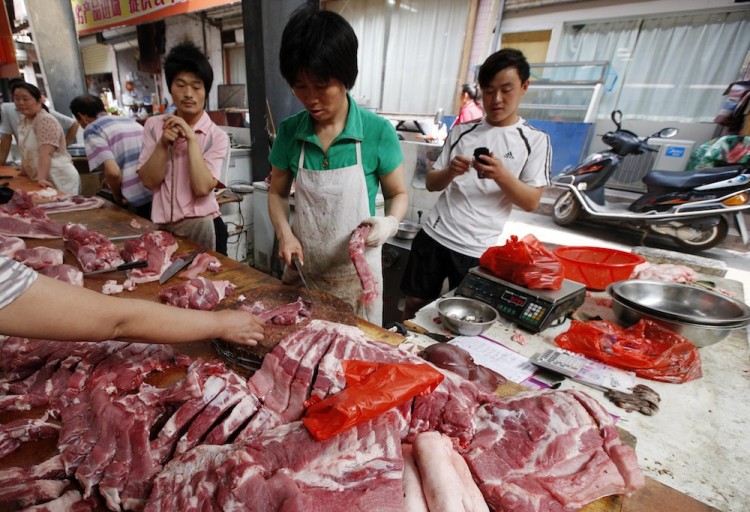A professor from a Chinese university has been implicated in the development and sale of a new type of “lean meat powder,” shining new light on the pervasiveness of tainted food production in China.
The addition of so-called “lean meat powder,” primarily the chemical clenbuterol, to animal feed has been widespread in China. It was meant to speed up livestock growth and to give the meat a leaner appearance, and thus sell for more money. But such chemicals can cause serious health problems in humans who eat the meat.
The Chinese Department of Agriculture banned clenbuterol in animal feed in 1997, after it was already banned by the E.U. in 1988, and in the U.S. in 1991.
But according to incomplete reports, during the last decade close to 2,000 people in China have been sickened, with at least one death reported, as a result of eating meat containing some form of “lean meat powder.”
Recently, a new chemical, phenylethanolamine A, has been found in pig feed in China, and a professor from a well-known university is said to be involved.
The matter came to light through a criminal investigation in Yueyang, Hunan Province, that revealed information related to the production and sales of phenylethanolamine A-containing animal feed in Fujian, Hunan, and Zhejiang provinces, the Southern Weekend reported on July 25.
The report said that since March of this year, pig feed from three different manufacturers based in Hunan, Fujian, and Guangzhou were sampled and tested. Test results from the National Feed Quality Supervision and Inspection Center showed that the feed from two manufacturers contained phenylethanolamine A, and around 2.5 tons of such pig feed had already been distributed in the local area.
Phenylethanolamine A, like other “lean meat powders,” such as ractopamine, speeds up pigs’ growth, gives the pigs red skin and shiny fur, and produces leaner meat. However, eating pork containing such powder can induce high blood pressure, heart disease, and other health problems.
University Professor Detained
In this latest Chinese tainted food product incident, Professor Zou from the prestigious Zhejiang University in Zhejiang province has been implicated and detained after investigators found 1,500 kg of pig feed containing phenylethanolamine A in his possession.
A July 26 report by Zhejiang Health Online revealed that Professor Zou works at the College of Animal Sciences at Zhejiang University. It said he is the vice director of the Animal Feed Institute, and that his work entails research in animal feed.
An official at the Animal Feed Institute told Zhejiang Health Online that he heard of Professor Zou having been taken away by police, but added: “That was entirely [a result of] his personal action. It definitely was not a professional action, and has nothing to do with the Research Institute.”
Zhejiang University, Center of ‘Lean Meat Powder’
Zhejiang University, one of China’s top universities, is believed to have been the center of “lean meat powder” research and production for the past couple of decades.
According to an investigation by Southern Weekend, many years ago, industry professionals all thought the “lean meat powder” was first developed by Zhejiang University.
Xu Zirong, a veterinarian and retired professor from Zhejiang University, was one of China’s foremost promoters of “lean meat powder” for many years.
According to a May 10 report on pigcn.cn, a website run by China’s pig industry, Xu was involved in collaborative research with the University of Virginia in the 1980s. At the time, the chemical clenbuterol caught Xu’s attention as the American firm Cyanamid had started manufacturing clenbuterol-containing animal feed in 1978, the report said.
After returning to China, Xu began doing research into the application of clenbuterol at Zhejiang University, Institute of Animal Feed. During this period, Xu published a paper, recommending the use of clenbuterol in pig feed. In the summary of his paper he said, “adding 15 mg/kg of clenbuterol gave the best effect.”
The National Science and Technology Commission later adopted Xu’s research as a key national scientific and technological project.
In 2009 Southern Weekend asked Professor Xu why he avoided mentioning the already known poisonous side effects of clenbuterol in his paper. Xu answered: “We didn’t want to go against the government. If the paper introduced the side effects, we wouldn’t have been able to publish.”
Southern Weekend also quoted from an internal report by Zhejiang University that said: “Since the year 2000, animal feed products from Zhejiang University, Institute of Animal Feed, developed by Xu Zirong, have been sold in over 20 provinces, netting 3.5 billion yuan (US$543 million). The Institute has also supplied many livestock feed companies, many of them are now having annual revenues exceeding 1 billion yuan.”
Food poisoning incidents due to “lean meat powder” have happened frequently in China. According to an Internet search by The Epoch Times, in the ten years between 1998 and 2008 there were 17 incidents of food poisoning attributed to “lean meat powder,” causing one death and over 1,700 people being sickened. In November 2001, 484 people were poisoned by “lean meat powder” in Heyuan, Guangdong Province alone.
Read the original Chinese article.




